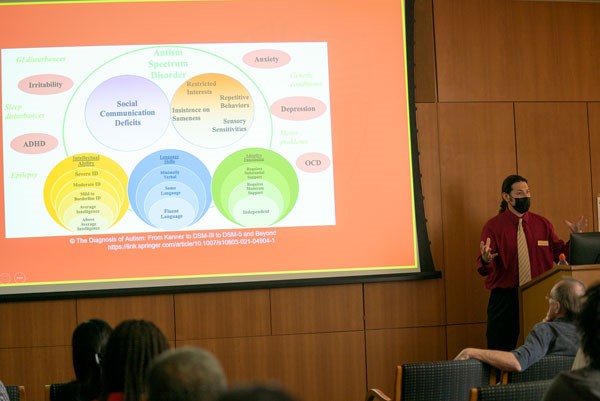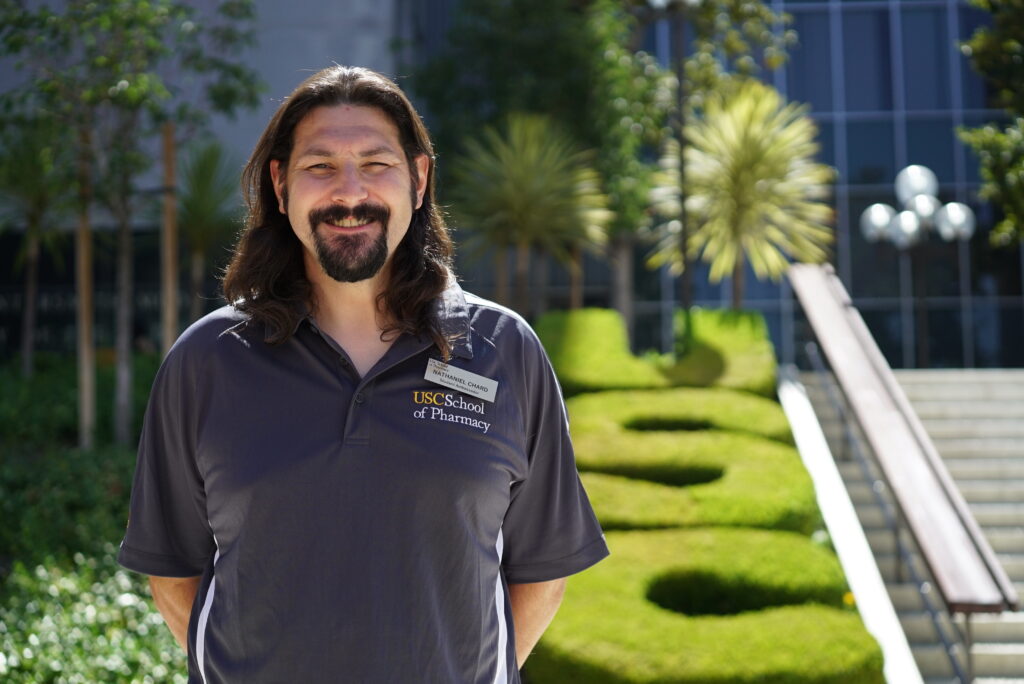Meet third-year PharmD student Nathaniel Chard, who recently presented his research on autism spectrum disorder at the 2022 Summer Research Programs Presentation Day. Here, Nathaniel shares what led to his decision to pursue a PharmD, and how his daughter’s autism diagnosis inspired his research.
What factors influenced you to choose USC?
I graduated with a dual master’s degree in biomedical sciences and public health from Charles R. Drew University of Medicine and Science in 2019. I became interested in pursuing a PharmD mainly due to the ability to utilize my knowledge in public health, health disparities, social determinants of health, and translational research. Pharmacists are also the most readily available healthcare professionals – they have greater opportunities to assist patients.
I applied to the USC School of Pharmacy because it is one of the top pharmacy schools in the nation and I knew this program would lead me down a path of success. The Trojan Family was also a significant factor because many alumni continue to be involved with the school, creating a supportive environment for students as they pursue their degree and seek out hands-on opportunities. I also remember having a fantastic experience during my interview process and met so many wonderful people, which ultimately affirmed my decision to invest in the program.
What has been your favorite part about your program so far?
It is hard to narrow down my favorite parts of the program as I have had so many positive experiences. I really appreciate the sense of collaboration between students and faculty. I am also incredibly grateful for the opportunity to cultivate strong relationships within the school community as a student ambassador for the Margaret and John Biles Student Leadership Center. Most importantly, I appreciate how the School of Pharmacy provides students with access to numerous hands-on opportunities that help students put their skills into practice in real-life clinical settings.
Can you share a little bit about your research project, “Comparability of Autism Outcome Measures”? What inspired your project?
The main inspiration began at home with my younger daughter, who has autism spectrum disorder. She was four years old when she, her mother and her older sister entered my life when I moved to Los Angeles from Michigan. Her diagnosis has had a huge impact on her life and the lives of her family members. As she was growing up, we all wanted to help and support her in every way we could, but often found ourselves without the necessary tools; when reaching out to medical professionals we often found them on the same boat as us. I always felt like I should be doing more, so I began to do more research and reached out to healthcare experts to learn more about autism spectrum disorder and how I can help others.

With the guidance of my faculty advisor, Dr. Nancy Pire-Smerkanich, assistant professor of regulatory and quality sciences, I was provided the opportunity to conduct my own research project titled “Comparability of Autism Outcome Measures,” which I presented at the 2022 Summer Research Programs Presentation Day. My research focused on the effects autism has on social behaviors, levels of irritability, and how repetitive behaviors are measured in interventional clinical drug trials, as well as the diagnostic criteria of autism that is used to select study participants. Through my research, I found that the population of individuals diagnosed with autism has increased, including a surge in clinical studies. However, no accurate set of tools has been established to measure study participants and their changes in symptoms, and there are no quality clinical practice guidelines for clinicians to follow when caring for a patient with autism. Therefore, I am committed to continuing to learn more about autism spectrum disorder and how to improve the quality of care for patients and their families who are affected by it.
What are your future educational/career goals and how do you think your course of study will help you reach them?
I enjoy conducting research, but I also enjoy teaching others. The interactions I have with patients as an intern pharmacist at Calabasas Pharmacy are also very fulfilling. I still have not made a concrete decision on my career path, but that is the beauty of the USC School of Pharmacy. The program has given me opportunities to dip my toes in so many areas of pharmacy to discover my interests or to see if something naturally clicks. At the very least, I know that I will have a world-class education and set of experiences that cover a vast area of the healthcare landscape. Wherever I end up, I am confident I will have the knowledge and skillset I need to be successful.
Is there anything else you would like to share about your experience at USC?
The field of pharmacy is seeing positive changes in how the healthcare system utilizes pharmacists. This can provide a lot of opportunities for the development of new pharmacy-related roles in areas where our healthcare system has been littered with gaps. To be a healthcare leader, one needs to have an education that prepares them to potentially tackle the unknown and the creativity to produce innovative ideas on how to better help our patients’ health outcomes. At USC, the curriculum is treated as a living, evolving entity that is constantly being updated to stay current with the ever-changing field. USC provides students with experiences they will not be able to find anywhere else. Our communities need a better system of healthcare, and the USC School of Pharmacy is uniquely situated to prepare future pharmacists to make a significant impact.


